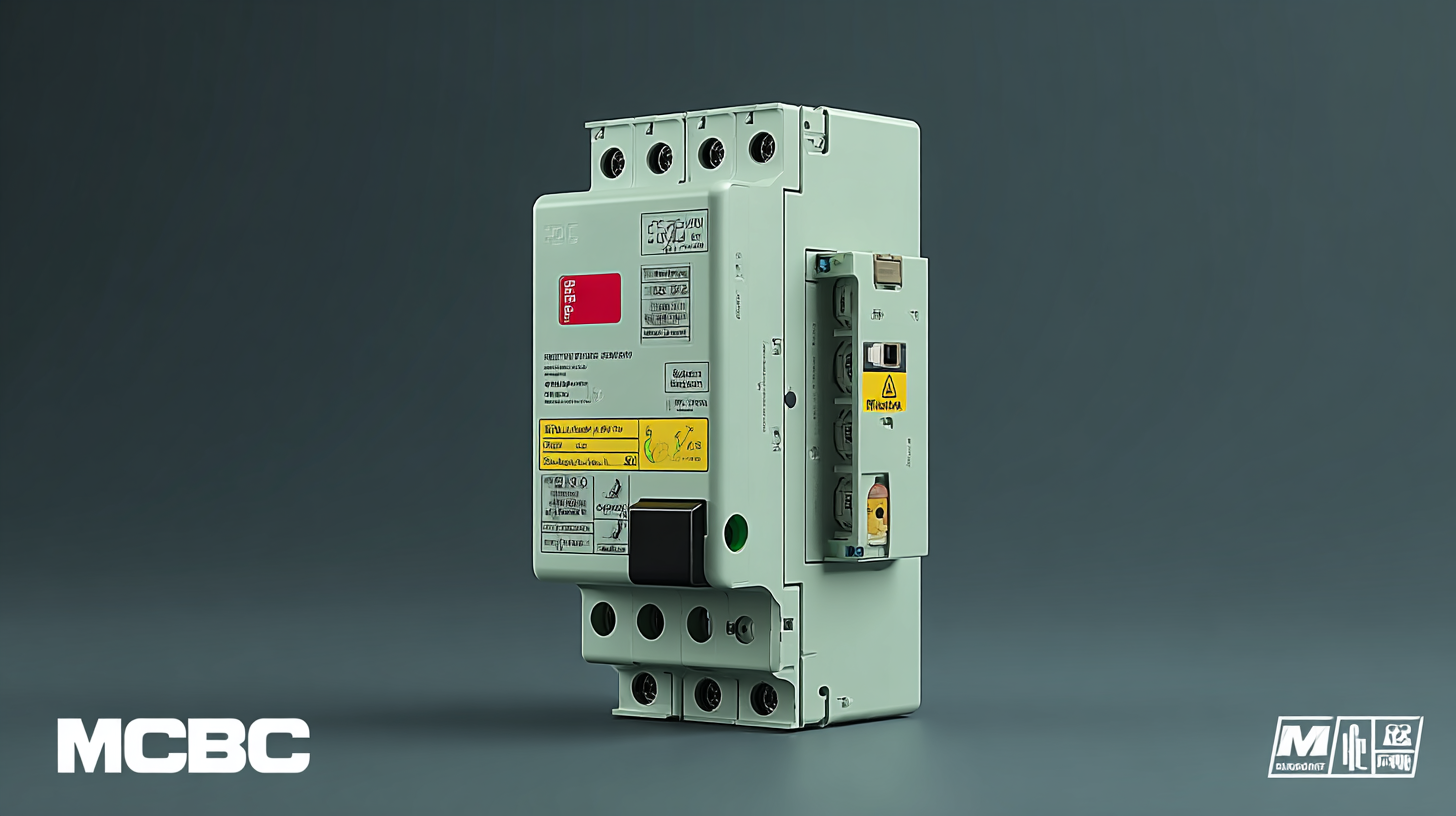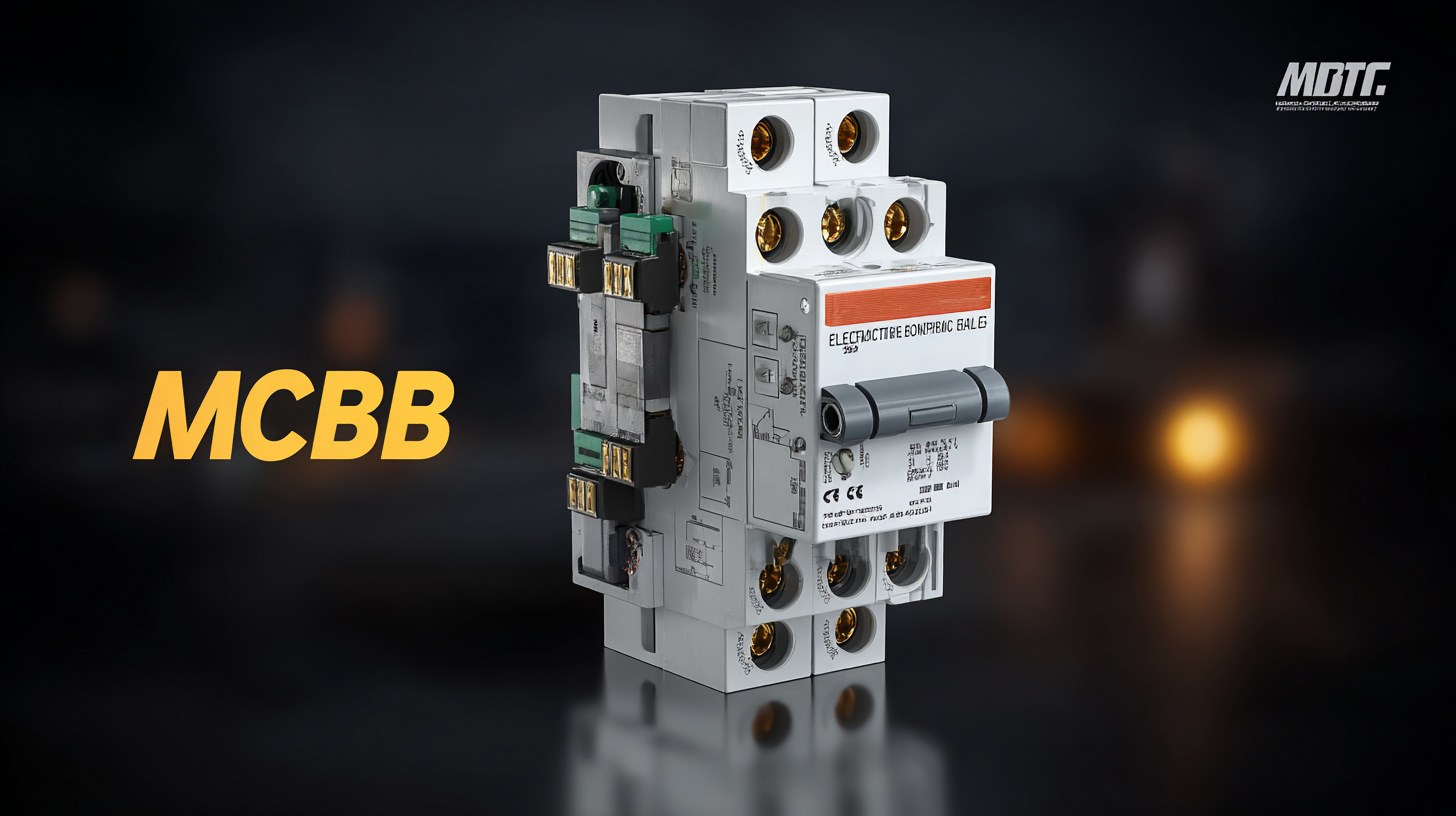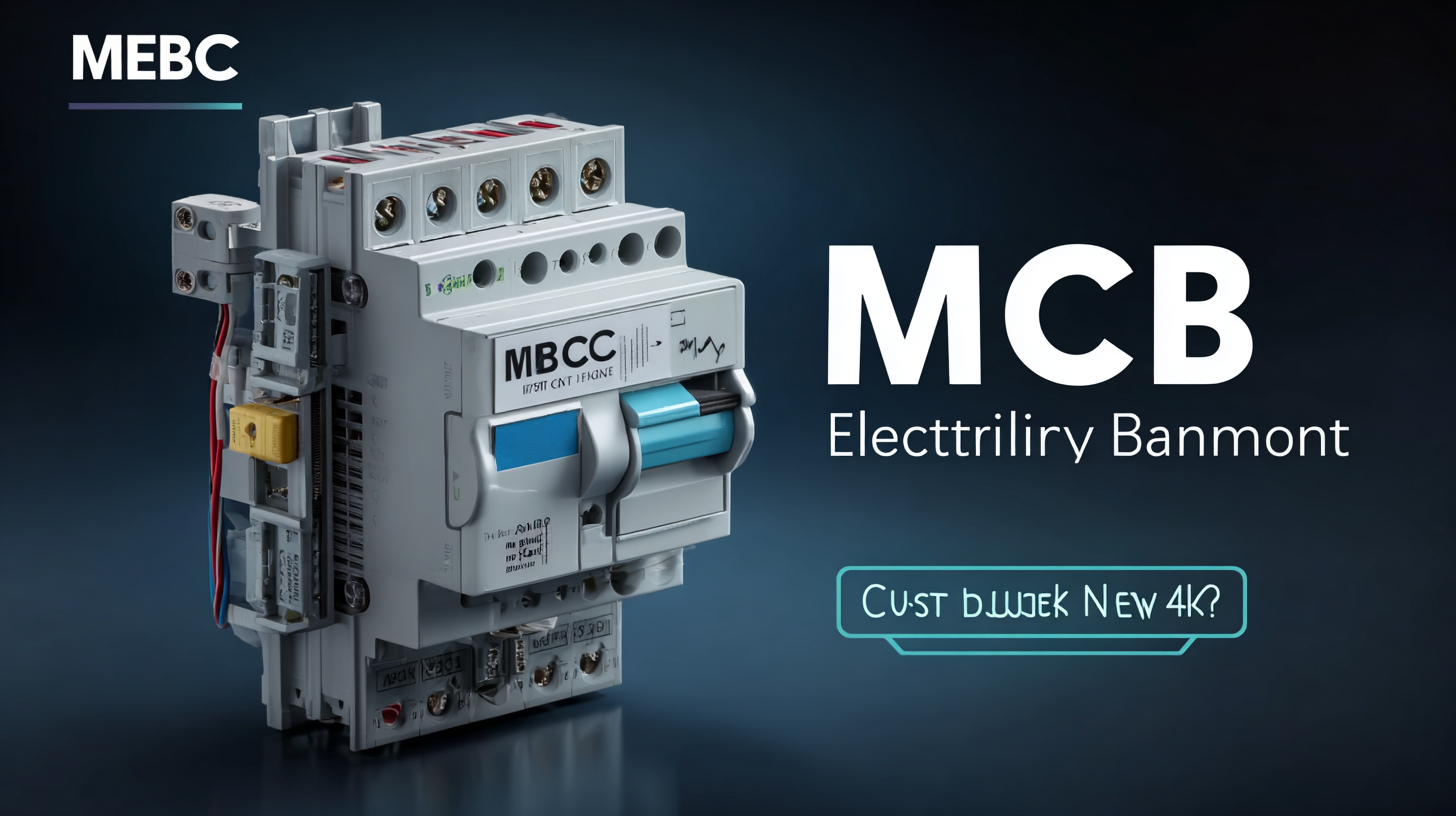
What is the Best Electrical MCCB and Why You Need One for Your Industry
In today's rapidly evolving industrial landscape, the need for reliable and robust electrical components is more crucial than ever. One such component that stands at the forefront of electrical safety and efficiency is the Electrical MCCB (Molded Case Circuit Breaker). According to industry reports, the global MCCB market is projected to reach USD 10.24 billion by 2026, growing at a CAGR of 5.6% from 2021 to 2026. This surge is driven by rising demand for power distribution in various sectors, including manufacturing, construction, and energy. As industries increasingly strive for operational excellence, investing in high-quality Electrical MCCBs becomes essential not only for safeguarding equipment but also for ensuring compliance with stringent safety standards. With “世界级的制造,中国骄傲,出口全球” echoing the commitment to world-class manufacturing, selecting the best Electrical MCCB is imperative for businesses looking to maintain reliability and innovation in their processes.

Understanding the Importance of MCCB in Industrial Applications
Molded Case Circuit Breakers (MCCBs) play a crucial role in protecting industrial systems from electrical faults and ensuring operational efficiency. Understanding their importance involves recognizing how they safeguard equipment and personnel from overloads and short circuits. In industrial applications where high loads and complex circuits are prevalent, MCCBs provide necessary protection by promptly interrupting electrical flow during fault conditions, thereby preventing potential damage to machinery and reducing the risk of fire hazards.
Moreover, the selection of the appropriate MCCB aids in maintaining the continuity of operations. They are designed with specific rating capacities and features tailored to meet the demands of various industrial environments. For example, MCCBs can be equipped with adjustable trip settings that allow customization based on the specific needs of the site, ensuring that sensitive equipment is not inadvertently shut down during minor fluctuations. This adaptability, combined with their ability to handle significant power levels, makes MCCBs indispensable in industries that rely on uninterrupted electrical service, ultimately contributing to enhanced safety and efficiency.
Comparison of MCCB Ratings in Industrial Applications
This chart shows the market demand for different MCCB ratings commonly used in industrial applications. As seen, the demand decreases as the rating increases, indicating a preference for lower ratings in more applications.
Key Features to Consider When Choosing an MCCB
When selecting an MCCB
(Molded Case Circuit Breaker) for industrial applications, several key features should be prioritized to ensure optimal performance and safety. First, understanding the current rating is crucial. According to a recent report by the Electrical Engineers Association, the most common current ratings in industrial MCCBs range from 16A to 2500A, allowing for tailored solutions that meet specific load requirements. This ensures that the breaker operates effectively without overload, providing a safeguard against potential damage to electrical systems.
Another important feature to consider is the breaking capacity. The breaking capacity, measured in kiloamperes (kA), indicates the MCCB's ability to handle short-circuit conditions. Industry standards suggest that a capacity of at least 10kA is essential for most industrial settings to ensure quick interruption of fault conditions. Furthermore, modern MCCBs often come equipped with advanced electronic trip units that offer customizable settings for overload and short-circuit protection, enhancing operational flexibility and safety. As reported by the Industrial Safety Journal, the use of intelligent MCCBs can reduce downtime by over 30% by proactively preventing failures and ensuring consistent system performance.
Evaluating the Reputation and Reliability of MCCB Manufacturers
When evaluating the reliability of MCCB (Molded Case Circuit Breaker) manufacturers, it's crucial to consider the reputation built through years of service and innovation. Recent market analysis indicates that the global MCCB market is expected to reach approximately $10 billion by 2026, propelled by the growing need for enhanced electrical safety standards across various industries. Notably, manufacturers with a proven track record in compliance with regulatory standards not only offer superior products but also demonstrate a commitment to safety and quality assurance.

In the face of increasing scrutiny over supply chains and the push for domestic sourcing, choosing reliable MCCB manufacturers has become more critical than ever. Industry reports reveal that companies prioritizing local sourcing and transparency in their manufacturing processes are likely to gain greater trust from consumers and businesses alike. For instance, manufacturers who consistently achieve high ratings in third-party evaluations and demonstrate robust customer service frameworks are often viewed as more dependable partners. With the ongoing necessity for effective electrical protection, sectors such as automotive and construction, which are experiencing rapid growth, underscore the importance of selecting reputable providers in ensuring operational efficiency and safety in industrial applications.
Comparative Analysis of Leading MCCB Brands in the Market
When selecting the best Molded Case Circuit Breaker (MCCB) for industrial applications, businesses are faced with a vast array of options from various leading brands. A comparative analysis reveals significant discrepancies in performance, reliability, and technology. For instance, according to a recent report by MarketsandMarkets, the global MCCB market is projected to reach $5.2 billion by 2026, with a compound annual growth rate (CAGR) of 5.3%. This growth is driven by increasing industrial automation and the need for effective power management systems, making the choice of MCCB even more crucial.
Top brands like Schneider Electric, Siemens, and ABB have led the market, each boasting distinct advantages. Schneider Electric's Acti9 MCCB features advanced thermal-magnetic protection and a compact design, catering to limited space requirements while ensuring high interrupting capacities. Siemens, on the other hand, offers the SENTRON line, which is known for its user-friendly interface and flexibility, allowing for easy integration into IoT systems.
ABB's Tmax series is recognized for its innovative digital connectivity solutions that enhance monitoring capabilities. In the rapidly evolving industrial landscape, the right MCCB not only enhances operational efficiency but also safeguards equipment and personnel, emphasizing the necessity of informed selection based on brand performance and technological advancements.

Common Mistakes to Avoid When Selecting MCCB for Your Industry
Selecting the right molded case circuit breaker (MCCB) for your industry is crucial, yet common pitfalls can lead to costly mistakes. One prevalent error is underestimating the importance of understanding your specific operational needs. Industries vary drastically in terms of electrical load, environment, and safety requirements, and failing to account for these factors can result in inadequate protection or unnecessary over-specification. According to industry reports, approximately 30% of equipment failures are attributed to improper circuit breaker selection, emphasizing the necessity of a thorough evaluation.
Another mistake often encountered is neglecting the comprehensive range of accessory components that can enhance MCCB functionality. Modern systems are designed to be modular and highly variable, allowing for customization that meets the precise needs of an industry. When choosing an MCCB, one must consider options such as surge protection, communication capabilities, and integration with existing systems. Recent advancements in circuit breaker technology reveal that optimizing these accessories can improve operational efficiency by up to 20%, highlighting the importance of a well-rounded selection process. By avoiding these common mistakes, industries can ensure reliable and effective electrical protection.

 JCB1-125
JCB1-125 JCB2-40M
JCB2-40M JCB3-63DC
JCB3-63DC JCB3-80H
JCB3-80H JCB3-80M
JCB3-80M JCBH-125
JCBH-125 JC125-4P
JC125-4P JCMX
JCMX JCSD
JCSD JCOF
JCOF JCMX1-125
JCMX1-125 JCOF1-125
JCOF1-125 JCSD1-125
JCSD1-125 JCR3HM
JCR3HM JCRD2-125
JCRD2-125 JCRD4-125
JCRD4-125 JCRB2-100
JCRB2-100 JC3RH-2P
JC3RH-2P JC3RH-S
JC3RH-S JC3RH-B
JC3RH-B JC3RH-BS
JC3RH-BS JCR2-63
JCR2-63 JCR1-40
JCR1-40 JCB2LE-80M
JCB2LE-80M JCB2LE-80M
JCB2LE-80M JCB2LE-80M
JCB2LE-80M JCB2LE-40M
JCB2LE-40M JCB1LE-125
JCB1LE-125 JCB3LM-80
JCB3LM-80 JCH2-125
JCH2-125 JCH2-125
JCH2-125 CJX2
CJX2 CJ19
CJ19 JCMCU
JCMCU JCHA
JCHA JCSD-40
JCSD-40 JCSD-60
JCSD-60 JCSP-40
JCSP-40 JCSP-60
JCSP-60 JCSPV
JCSPV WEW1-1000
WEW1-1000 WEW1-1600
WEW1-1600 WEW1-2000
WEW1-2000 WEW1-3200
WEW1-3200 WEW1-4000
WEW1-4000 WEW1-6300
WEW1-6300 DC6-125
DC6-125 AX-400-1250
AX-400-1250 AXAL-400-1250A
AXAL-400-1250A AL-400-1250
AL-400-1250 DC3-160
DC3-160 AXS-400-1250A
AXS-400-1250A SHT-125-160
SHT-125-160 UVT-125-160A
UVT-125-160A P-250A-3P-A
P-250A-3P-A 400-3P/4P terminal cover
400-3P/4P terminal cover 1250-3Pmccb accessories busbar
1250-3Pmccb accessories busbar 250-3P terminal conver
250-3P terminal conver WLM6-TCV-160A-3P
WLM6-TCV-160A-3P WLM6-MIP-250A
WLM6-MIP-250A WLM6-125A-3300 3P/4P
WLM6-125A-3300 3P/4P WLM6-160A-3300 3P/4P
WLM6-160A-3300 3P/4P WLM6-250A-3300 3P/4P
WLM6-250A-3300 3P/4P WLM6-400A-3300 3P/4P
WLM6-400A-3300 3P/4P WLM6-630A-3300 3P/4P
WLM6-630A-3300 3P/4P WLM6-800A-3300 3P/4P
WLM6-800A-3300 3P/4P WLM6-1250A-3300 3P/4P
WLM6-1250A-3300 3P/4P WLM6-1600A-3300 3P/4P
WLM6-1600A-3300 3P/4P WLM6-2000A 3P/4P
WLM6-2000A 3P/4P WLM8-125H-3300
WLM8-125H-3300 WLM8-250H-3300
WLM8-250H-3300 WLM8-400H-3300
WLM8-400H-3300 WLM8-400H-4300
WLM8-400H-4300 WLM8-630H-3300
WLM8-630H-3300 WLM8-630H-4300
WLM8-630H-4300 WLM6RT-125A
WLM6RT-125A WLM6RT-160A
WLM6RT-160A WLM6RT-250A
WLM6RT-250A WLM6RT-400A
WLM6RT-400A WLM6RT-630A
WLM6RT-630A WLM6RT-800A
WLM6RT-800A WLM6RT-1250A
WLM6RT-1250A WLM6E-160A-3300 3P
WLM6E-160A-3300 3P WLM6E-250A-3300
WLM6E-250A-3300 WLM6E-400A-3300 3P/4P
WLM6E-400A-3300 3P/4P WLM6E-630A-3300
WLM6E-630A-3300 WLM6E-800A-3300 3P/4P
WLM6E-800A-3300 3P/4P WLM6E-1250A-3300
WLM6E-1250A-3300 WLM6E-1600-3300 3P/4P
WLM6E-1600-3300 3P/4P WLM6E-2000A-3300 3P/4P
WLM6E-2000A-3300 3P/4P WLM8E-250H-3300
WLM8E-250H-3300 WLM8E-400H-3300
WLM8E-400H-3300 WLM8E-400H-4300
WLM8E-400H-4300 WLM8E-630H-3300
WLM8E-630H-3300 WLM8E-630H-4300
WLM8E-630H-4300 WLM6EY-250-3300 3P/4P
WLM6EY-250-3300 3P/4P WLM6EY-400 3P/4P
WLM6EY-400 3P/4P WLM6EY-630 3P/4P
WLM6EY-630 3P/4P WLM6EY-800A 3P/4P
WLM6EY-800A 3P/4P WLM6EY-1250A 3P/4P
WLM6EY-1250A 3P/4P WLM6ELY-160A
WLM6ELY-160A WLM6ELY-250A
WLM6ELY-250A WLM6ELY-400A
WLM6ELY-400A WLM6ELY-800A
WLM6ELY-800A WLM6ELY-1250A
WLM6ELY-1250A WLM8EY-250H-3300
WLM8EY-250H-3300 WLM8EY-400H-3300
WLM8EY-400H-3300 WLM8EY-630H-3300
WLM8EY-630H-3300 WLM6LY-125A
WLM6LY-125A WLM6L-160A
WLM6L-160A WLM6LY-250A
WLM6LY-250A WLM6LY-400A
WLM6LY-400A WLM6LY-800A
WLM6LY-800A WLM6LY-630A
WLM6LY-630A WLM6LY-1250A
WLM6LY-1250A WLM8LY-125H-3300
WLM8LY-125H-3300 WLM8LY-250H-3300
WLM8LY-250H-3300 WLM8LY-400H-3300
WLM8LY-400H-3300 WLM8LY-630H-3300
WLM8LY-630H-3300 JCB3-63DC
JCB3-63DC JCB1-125DC
JCB1-125DC WLM7DC-250A-2300 2P/3P
WLM7DC-250A-2300 2P/3P WLM7DC-315A-3300 2P/3P
WLM7DC-315A-3300 2P/3P WLM7DC-400A-2300 2P/3P
WLM7DC-400A-2300 2P/3P WLM7DC-630A-3300 3P
WLM7DC-630A-3300 3P WLM7DC-800A-2300 2P/3P
WLM7DC-800A-2300 2P/3P WLM7DC-400A 2300
WLM7DC-400A 2300 WLM7DC-630A-2300 2P
WLM7DC-630A-2300 2P WLM7HU-250-3300 3P
WLM7HU-250-3300 3P WLM7HU-315-3300 3P
WLM7HU-315-3300 3P WLM7HU-400-3300 3P
WLM7HU-400-3300 3P WLM7HU-630-3300 3P
WLM7HU-630-3300 3P WLM7HU-800-3300 3P
WLM7HU-800-3300 3P PV-1500V/250A
PV-1500V/250A WEW3-1600
WEW3-1600 WEW3-2500
WEW3-2500 WEW3-4000
WEW3-4000 WEW3-7500
WEW3-7500



